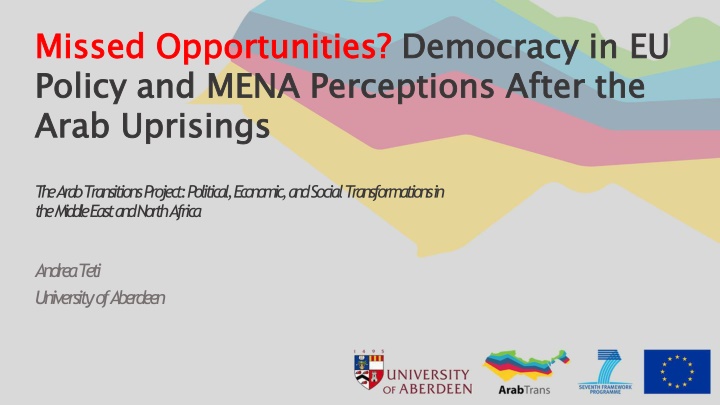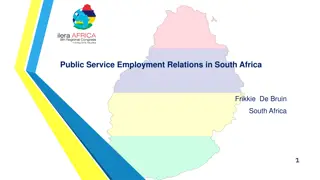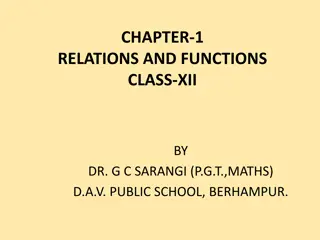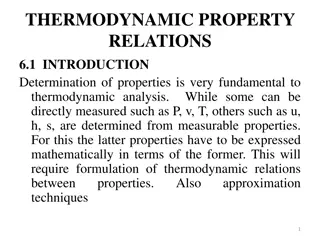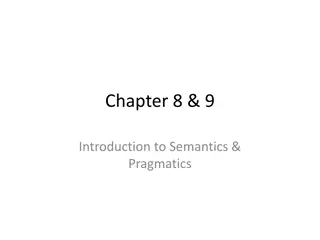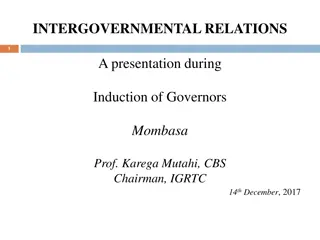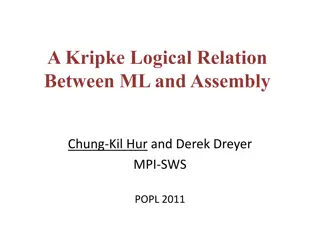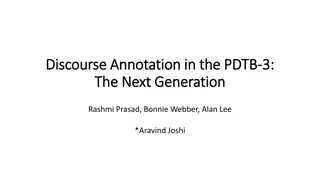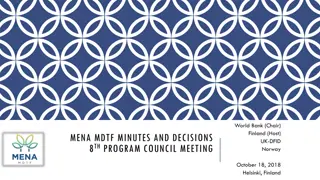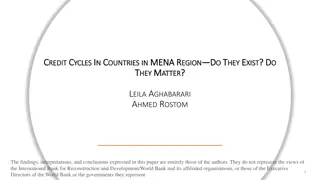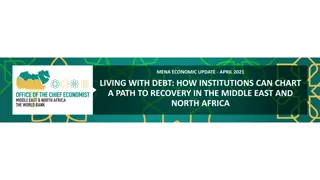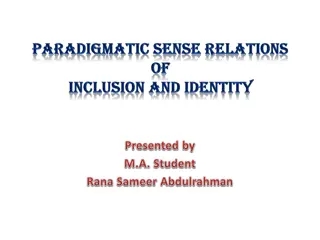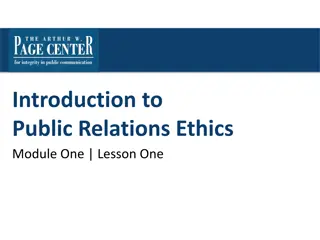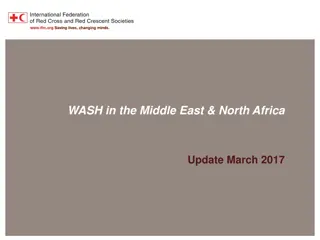Perceptions and Policy Choices in EU-MENA Relations
Explore the intricacies of EU-MENA relations post-Arab uprisings, focusing on missed opportunities, democracy perceptions, policy frameworks, and social transformations in the region. Delve into the evolution of EU policies pre- and post-uprisings, analyzing the role of democracy, human rights, and development in shaping the discourse. Uncover the challenges and potential new approaches in responding to the changing political landscape in the Middle East and North Africa.
Uploaded on Sep 21, 2024 | 1 Views
Download Presentation

Please find below an Image/Link to download the presentation.
The content on the website is provided AS IS for your information and personal use only. It may not be sold, licensed, or shared on other websites without obtaining consent from the author.If you encounter any issues during the download, it is possible that the publisher has removed the file from their server.
You are allowed to download the files provided on this website for personal or commercial use, subject to the condition that they are used lawfully. All files are the property of their respective owners.
The content on the website is provided AS IS for your information and personal use only. It may not be sold, licensed, or shared on other websites without obtaining consent from the author.
E N D
Presentation Transcript
Missed Policy Arab Missed Opportunities? Policy and Arab Uprisings Opportunities? Democracy and MENA Uprisings Democracy in Perceptions After in EU the EU MENA Perceptions After the T h e Arab Transitions Project: Political, Economic, and Social Transformations in the Middle East and North Africa Andrea Teti University of Aberdeen
WP1 WP2 WP6 WP8 WP7 WP9 Explore Models WP5 Data Transition Analyses Theory, Method Backgr d Reports Country Reports Youth & Social Media EU-MENA Transition Dataset Pol Survey ENP / DA Policy Area Studies Hybrid regimes Arab- Trans Survey Data (2014) Mobilisation Longitudinal Database Soc Surveys, Indicators Resilience Information Age MENA Perception of EU policy Brittle Political Science / Sociology Econ Cyclical Work Packages
B a c k g r o u n d From Arab Spring to Islamist Winter?
M e t h o d o l o g y Documents Pre-Uprisings The EU s Role In Promoting Human Rights And Democratisation In Third Countries (2001) EU post-Enlargement Neighbourhood Policy (2004) Strengthening the ENP (2006) COM(2009)188/3, 2008 ENP implementation review Post-Uprisings PfDSP 08/03/2011; NRCN 25/05/2011 Delivering a New ENP 15/05/2012 Working Towards Stronger Partnership 20/03/2013 Neighbourhood at the Crossroads, 27/03/2014 Review of ENP, 18/11/2015 Discourse Analysis: conditions of possibility Caveats: multiple programmes: ENP, EIDHR, UfM, etc. multiple institutions/cultures: EEAS (Council/RelEx) multiple authors
A N e w approach responding to the Uprisings? ThreeDs : Delivery, Development, Democracy 1. Delivery: Pre-AU: positiveconditionality vs.Post-AU: more-for-more (N.B.: JOIN(2013)4 benchmarking) 2. Development: Pre-AU & Post-AU: sustainable and inclusive growth (method: FTAs)
Democracy I Preambles: holistic conception of democracy: 27 Democracies, indivisibility of HR, inclusive growth, partnership From Inseparability of HR to Hierarchy: civil-political (elections) > socio-economic (labour) Selectivity: e.g. voting > association, protest = thin democracy: procedural & market-driven
Democracy I I Civil Society: orthodox definition (vs. socialpartners ) TUs disappear into DevCo/Trade vs. JOIN(2013)4 funding unreg. groups Social & Economic rights: democracy is associated with expressions citing or referring to civil & political rights is never explicitly associated with social & economic rights (only in preambles) PfDSP referers to socio-economic inequality, subsequent documents do not: soc/econ aid & outside DHR framework From rights to aid: competence DevCo/Trade/IFIs: from entitlement to concession Conceptual Structure of Democracy : 1. civ-pol>soc-econ HR; 2. rights aid Explanation for (low) EU popular credibility/reputation?
Preliminary Conclusions Conceptual Structure of Democracy Hierarchy of HR: civil, political > economic, social Moral economy of Democracy: From rights to aid Explanation for (low) EU popular credibility/reputation (also degree of non-normativity of EU power)?
Conceptions of Democracy in MENA Populations
T w o Essential Characteristics of Democracy % By Type of Characteristic A Political Right An Economic Right Fighting Corruption 78.8 78 74.8 73.8 69.5 62.8 61.8 61.3 60.8 59.5 57.1 52.4 50.1 42 34.7 32.9 32.5 32 30 23 19.7 Egypt Iraq Jordan Libya Morocco Tunisia Total
D e m a n d s for Political Rights, E c o n o m i c Rights, & Fighting Corruption as Drivers of the Arab Uprisings % Nominating as One of Two Reasons Corruption Political Economic 76.9 69.2 63.8 63.8 62.861.3 62.2 57.7 57.1 57.3 53.1 50.5 49.5 47.8 44.9 42.8 41.1 36.4 34.5 23.4 21.4 Egypt Iraq Jordan Libya Morocco Tunisia Total
Perceived Challenges, % Nominating as One of Two Main Challenges 90.3 87.6 Economic Situation 79.8 79.3 71.3 70 Corruption of Politicians and/or Civil Servants 6162.1 60 58.6 55.3 49.2 51 49.5 48.7 42.2 Internal Security 37.3 28.5 20.7 17.4 Authoritarianism 9.8 12.1 92.8 12.9 2.3 2 6.6 8.8 Egypt Iraq Jordan Libya Morocco Tunisia Total
I s Democracy I n c o mp a tibl e w i t h I s l a m? Agree 30.4 27.7 Disagree 23.3 21.2 18.8 6.3 Egypt Iraq Jordan Libya Morocco Tunisia -45.7 -58.6 -65.4 -68.5 -70.7 -72.6
Democracy Preferable System of Gov't & Gov't Should Make Laws According to Wishes of the People Democracy Better than Alternatives % Self-Describing as religious Make Laws According to the Wishes of the People Religious 89.8 Somewhat religious 81.775.2 80.3 78.4 77.7 Not religious 74.669.2 6% 63.1 62.1 61.359.5 56.8 51.2 39% 55% Egypt Iraq Jordan Libya Morocco Tunisia Total
I m p l e m e n t i n g Sharia: Breadth a n d D e p t h Extent to Which Government Should Implement Sharia, % Selected Countries Extent to Which Different Categories of Laws Should be Based on Sharia Family Law Criminal Law Inheritance Law No/R Partly Only 96.2 94.4 9490.7 93.5 89.1 92.6 88.5 86.4 9188.2 85.1 84.6 25.1 83.6 32.1 77.8 77.7 40.5 41.5 63.4 62.3 59.6 52.4 74.8 33 48.1 61.8 56.7 53.4 TUNISIA ALGERIA EGYPT IRAQ JORDAN LIBYA MOROCCO 24.4 0.8 19.8 13.1 5.1 2.7 TUNISIA EGYPT IRAQ JORDAN MOROCCO
T y p e of G o v e r n m e n t Suitable for Country, % 60 Preference for a Religious Party, % Undecided 80 50 60 Unrestricted Parliamentary Democracy 40 40 20 0 Parliamentary System - Islamic parties only Authoritarian executive 30 -20 -40 -60 20 -80 Agree Prefer a Religious Party 10 Disagree Prefer a Religious Party Non- Parliamentary Islamic System 0 Egypt Iraq Jordan Libya Morocco Tunisia
Conclusions 1 . E U Policy: Centred o n formal, procedural democracy Hierarchy of H R (civil-political > social-economic) F r o m rights to a i d 2 . M E N A Populations: C o m p l e x v i e w of democracy Thick (formal) vs. thin (substantive): social justice & economic rights inclusive & politically sustainable development N o single political role or effect of religion Religious values, organizations, & leaders are distinct Separation of public and private (soc/econ) 3. Implications: Mobilisation & Radicalisation
